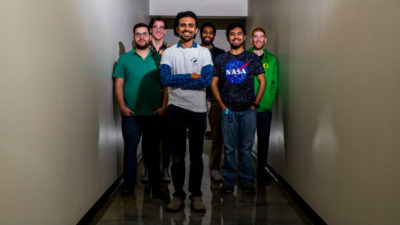Team assists with planned observations with next great space observatory
The James Webb Space Telescope, the scientific successor to the Hubble Space Telescope, is scheduled to launch in the spring of 2020. It is expected to make history as the largest astronomical observatory ever sent into space, and University of Missouri-Kansas City scientists and students will be among those getting the earliest access to it.
The Webb Telescope’s initial missions will include a survey of galaxies and their nuclei, stellar clusters and star formation near and far, the chemistry of interstellar and circumstellar matter, and the characterization of exoplanets. Of the 13 projects selected worldwide to first use the new telescope, one included efforts by Daniel McIntosh, Ph.D., an award-winning professor of physics and astronomy at UMKC, and six of his students.
These students are members of the UMKC Galaxy Evolution Group founded by McIntosh in 2009. “We work to help study the birth of the first massive galaxies created in cosmic pileups in the first few billion years after the Big Bang,” McIntosh said. Their collaboration is with an international team led by Professor Steven Finkelstein from the University of Texas at Austin on a Webb Telescope project called the Cosmic Evolution Early Release Science (CEERS) Survey.
Astronomers try to make sense of the evolving universe by studying the evolution of the galaxies that populate it. Galaxy merging is a process in which two adjacent galaxies interact gravitationally and coalesce to form one larger galaxy. Astronomers think that this process may have played a vital role in making the large galaxies that we see today.
“At UMKC, we are actively studying the role of this process towards several key aspects of galaxy evolution,” said Kameswara Mantha, one of McIntosh’s Ph.D. students who is leading aspects of the research project.
He said the project will shed light on key questions about very early times in the universe such as how often galaxies merge and how important this process is relative to other mechanisms driving growth and transformation of the galaxies.
Mantha also has bigger plans.
“While preparing for the submission of the awarded (Webb Telescope) program, I have developed a novel method to isolate merger-related features,” Mantha said. His research is in collaboration with other student researchers and Prof. McIntosh focusing on identifying the elusive signatures of galaxy mergers, as part of a recently funded Hubble Space Telescope archival study. These students call themselves UMKC-GREAT. It’s an acronym for Galfit (a data analysis algorithm) Residual Analysis Team. Mantha noted, “I aim to use my method to carry out a multi-wavelength analysis of galaxy-galaxy interaction features to study their physical properties.”
Mantha said the Webb Telescope will provide simultaneous high-resolution, longer-wavelength images of galaxies at much greater distances than the Hubble. Leveraging the highly-sensitive instruments onboard the Webb, Mantha said they plan to probe and study physical properties of the much-fainter morphological disturbances hosted by merging galaxies.
Logan Fries also participates on this project as an undergraduate researcher with McIntosh. “This project is important because we are requesting early access on James Webb to showcase its ability to detect faint signs of galaxy merging that will be a huge improvement to the Hubble Space Telescope capabilities,” Fries said. “This project is interesting because we are looking at distant galaxies and tracking merger history.”
Fries is seeking a Bachelor of Science degree in physics and astronomy and plans to graduate in 2019. He hopes to get a Ph.D. in astrophysics and continue doing research. “This project helps me achieve my goals because it gives me cutting-edge research experience!”

